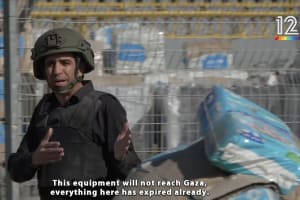As massive cyberattack cripples banks in Iran, Supreme Leader Khamenei vows ‘divine wrath’ if Iran backs down from attacking Israel
Iranian regime is rocked by internal squabbles

With Israel continuing to await the promised Iranian retaliatory attack for the alleged Israeli assassination of Hamas leader Ismail Haniyeh in Tehran two weeks ago, most media coverage has focused on Iran’s blustering threats and Israeli preparations.
The Iranian regime appears indecisive and is facing internal criticism, with the new government already showing signs of disarray, even before a massive cyberattack reportedly crippled the nation's banking system on Wednesday.
According to opposition news outlet Iran International, the cyberattack significantly disrupted the operations of the Central Bank of Iran and other financial institutions, shutting down all computer systems. The attack was described as one of the largest-ever on Iran’s state infrastructure.
#BREAKING A major cyberattack has targeted the Central Bank of Iran (CBI) and several other banks, leading to widespread disruptions in the country’s banking system, @IranIntl has learned. Initial assessments indicate this could be one of the largest cyberattacks ever against… pic.twitter.com/6TiuNrxosL
— Iran International English (@IranIntl_En) August 14, 2024
According to reports in Israeli media, signs were hung on ATM machines across the nation on Wednesday, which read: “Announcement by the Central Bank - Dear citizens, it is not possible to withdraw money because all the bad money and the resources were diverted to the war affairs of the corrupt regime, we are very sorry.”
Unlike similar previous cases, the government has so far not accused Israel or made any other comments, and there has been only limited corroboration of the report from social media.
Reports indicate that Israel has previously conducted several cyberattacks on Iranian state infrastructure, targeting facilities such as train stations and gas stations.
Earlier this week, the World Bank had warned the regime that a large-scale war with Israel would have catastrophic consequences for its economy, including a higher level of unemployment among youth, a decrease in foreign investment and rapid currency devaluation.
“The inevitable devaluation of the Iranian currency would reignite inflation,” the report stated. “The Iranian government would be forced to divert a significant portion of its budget to defense and military needs, at the expense of critical social and economic goals.”
Ignoring the potential consequences, and despite reports suggesting Iran could consider scrapping its retaliatory strikes if Hamas and Israel reached a ceasefire agreement, the regime’s Supreme Leader Ali Khamenei doubled down on Wednesday, Iran International reported.
Khamenei vowed that any "non-tactical retreat – whether military, political, or economic – would invite 'divine wrath,' as per the Holy Quran."
According to Iran International, he added: “Governments that yield to the demands of today's dominant powers, regardless of the size or strength of the nations they represent, could defy these pressures if they draw on the strength of their people and accurately assess their adversaries’ true, unembellished capabilities.”
The surprise assassination on the day of the inauguration of the regime’s new president Masoud Pezeshkian threw the new government into disarray right away. Despite vowing revenge immediately after the death of Haniyeh, over two weeks have passed without a move since then.
One reason for this is apparently the desire to “clean house” before launching an attack. According to the New York Times, a special unit of the Islamic Revolutionary Guard Corps (IRGC), responsible for the security of Haniyeh when he was killed in an IRGC compound, is actively pursuing suspects and has made numerous arrests.
“The Supreme Leader has summoned all the commanders several times over the past two days, he wants answers. For him, addressing the security breach is now more important than seeking revenge,” the British Telegraph reported following the assassination.
While Iranian officials claimed the wait was part of psychological warfare against Israel, it seems the regime is also distracted by internal squabbles. Pezeshkian has publicly affirmed Iran’s right to retaliate, but in private, has reportedly urged Khamenei to reconsider.
In addition, the president’s most prominent cabinet nominee, former Foreign Minister Javad Zarif, already announced his resignation on Sunday night. He claimed this wasn’t due to “disillusionment or disappointment” with Pezeshkian’s proposed administration.
Despite being elected on a reformist platform, even Pezeshkian's supporters have criticized the cabinet choices, with analysts noting that key positions, including the foreign, intelligence and defense ministers were selected by Khamenei.
Additional selections were influenced by the hardline IRGC and other power brokers, according to Iran International.

The All Israel News Staff is a team of journalists in Israel.
You might also like to read this:














